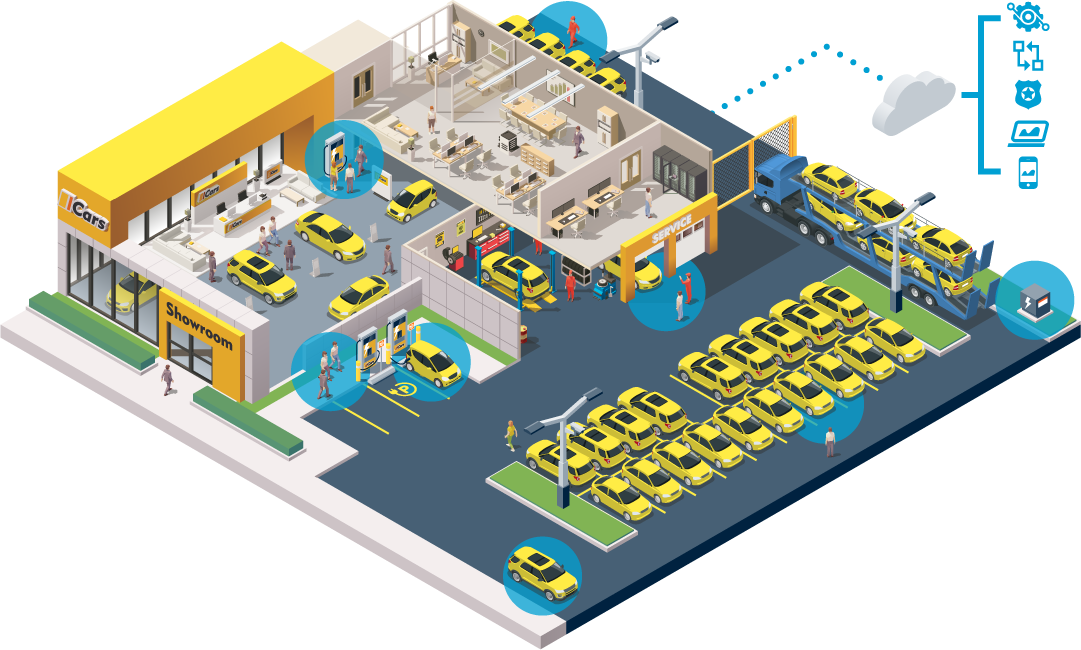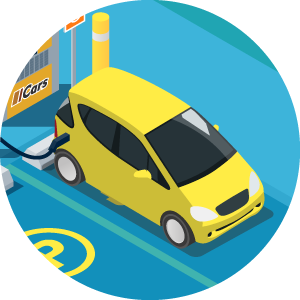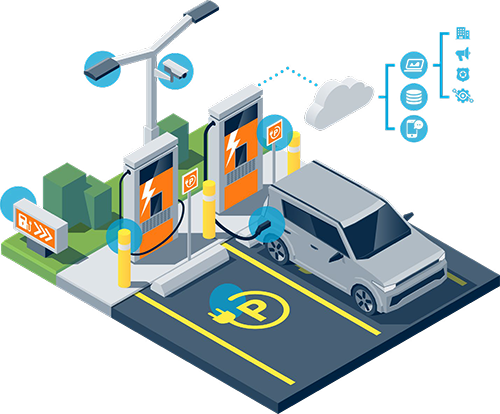Hotel EV Charger Hardware Choices
Start at the end. That’s the advice Future Energy provides for our clients. Before you begin to consider EV Charger hardware choices for your hotel, it’s critical to consider your objectives in serving the guests who drive electric vehicles (EVs).
What are your business’s goals concerning EV charging? Hardware choices are a later step in the process, well after you’ve laid out your goals and developed your EV charging strategy.
Every hotel has its own unique use case. Owners of multiple franchises in a number of states across different brands especially face complexities as they integrate EV charging into their enterprises.
Ultimately, your guests will want and expect to charge their EVs during their stay at your hotel. You want to choose the most suitable and cost-effective networked EV charging hardware to exceed guest expectations and enhance your brand.

Types of EV Charging Hardware for Your Hotel
There are three types of EV chargers, primarily distinguished by the type of electricity they use and how fast they deliver a charge. Commercial chargers are either level 2 or level 3. Level 1 chargers work off a typical 120-volt residential outlet and are not appropriate for commercial use.
Level 2 EV Chargers
Level 2 chargers are the most popular type of EV charger and are available for both residential and commercial use. Like a large appliance such as a clothes dryer, they run off 240-volt power.
Level 2 chargers operate up to 19.2 kilowatts and can generally charge an EV at around 40 miles per hour. An overnight charging session on a commercial level 2 EV charger is more than enough to replenish a vehicle’s battery. Level 2 chargers are, therefore, the most common for hotels to serve overnight guests.


Level 3 EV Chargers
Level 3 chargers, or direct-current fast chargers (DCFC), run on 480-volt three-phase power. They can fully charge an EV in about a half hour. And while level 2 chargers may seem more than adequate for overnight guests, there are other reasons why hotels may want to install level 3 chargers.
There are many financial incentives available at the state, local, and federal levels to offset the cost of EV charger installation. But your ability to qualify for certain federal funding involves offering level 3 charging to the public.
The National Electric Vehicle Infrastructure (NEVI) program lays out the standards and requirements to obtain federal money for EV charger installation. It may be worth the financial offset for you to install at least one level 3 charger at your hotel.
Qualification for funding is very complicated, and the money is limited. Future Energy helps our clients to uncover 99% of all available funds through our Financial Incentive National Database (FIND) tool. We also help to guide you through the process of applying for and accessing funds.
EV Charging Environment
Regardless of the types of chargers you decide upon, Future Energy offers a complete suite of hardware, components, connectivity, and software through our charging environment, ChargeParcTM. ChargeParc creates an EV experience that your guests will value and your staff can easily manage.
Among its many benefits, ChargeParc offers customizable features to enhance the guest experience while helping to reinforce your brand:
- Striping and bollards
- Branded directional and parking signage
- Numerous safety features
- Network connectivity to integrate with your hotel’s app as well as public EV charging networks for greater visibility
EV Charging Hardware to Support the Guest Experience
Part of the guest experience involves ensuring that their EVs are fully charged when they need them. Depending on your particular strategy, this could involve self-parking and charging solutions or involvement of your hotel’s valet.
Security
Guests will want to be sure that their vehicles are safe while they charge.
ChargeParc offers many features that you can customize for the security of your guest. These include:
- Lighting, including dimming and safety coloring
- Safety video with voice and sound commanding
- Actionable parking enforcement integration
- Fire and life safety systems
Parking
Your hotel can integrate EV charging with your parking options. For example, guests could scan their room key to access EV charging behind a gate. Parking enforcement ensures that only hotel guests are using your EV chargers.
For instance, one feature of ChargeParc is bollards that contain security cameras. These cameras let you monitor parking remotely, automatically, or with human intervention.

Valet Support
Additionally, your valet service can easily offer EV charging, rotating guests’ EVs through their charging sessions.
You may choose to enhance your guest experience by offering level 3 charging. The valet can fully charge a vehicle in about a half hour in response to a guest’s request.
Strategic Adaptations for Your Hotel’s Use Case
While it is possible to use EV chargers as stand-alone pieces of equipment, Future Energy recommends that you network your EV chargers. Stand-alone chargers must be programmed manually at the machine and have no visibility over the internet.
Some EV chargers, such as those from Future Energy partner ChargePoint, have their own network and associated app. Other EV chargers have networking capabilities, so you can connect them to your own systems and control them remotely.
Incorporating EV Charging Management Software
Future Energy’s Interface software connects, measures, and manages all of the electrical systems on your property. It integrates your networked EV chargers with your hotel’s business systems, including guest reservations and your brand’s app.
Interface also connects with your local utility so that you can set parameters on power usage and associated costs.
Understanding Electricity Costs
The installation of EV chargers could add hundreds of kilowatts to your energy consumption, resulting in thousands of dollars extra per month in demand costs. The utility bases demand costs on how much energy you consume during a specific period.
Future Energy helps you strategize on how best to avoid these costly increases in demand charges. For example, it’s possible to throttle the kilowatt output of a level 3 charger to trim demand charges. But lower output means EVs take longer to charge. The key is to figure out the balance between cost and time management for your business to maximize the guest experience without running up your property’s electricity bill.
Gaining Benefits from Public-Facing EV Chargers
To attract guests to your hotel, EV drivers must be able to “see” your chargers over the internet. Many hotel apps already include the option for travelers to check a box for “provides EV charging.” Your networked chargers can make a difference in a potential guest’s hotel choice.
Additionally, many financial incentives are available only to businesses that install networked chargers. EV chargers that connect to the internet can show up on mobile apps so that the public can find them.
Support and Information about EV Charging Hardware
The hardware choices your hotel makes are part of a larger strategy that must consider a number of complex challenges particular to your business use case. Contact Future Energy today for more information on how we can help integrate the proper EV charging hardware into your hotel’s offerings to enhance the guest experience.
